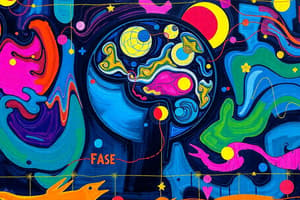Podcast
Questions and Answers
What is the difference between phenomenal consciousness and the consciousness described in the text?
What is the difference between phenomenal consciousness and the consciousness described in the text?
- Phenomenal consciousness is directly accessible for the control of actions, speech, and further thought, while the consciousness described in the text is not.
- Phenomenal consciousness is ineffable, ephemeral, and inexpressible subjective qualitative 'feel', while the consciousness described in the text is not. (correct)
- Phenomenal consciousness is not related to our thoughts about the weather, while the consciousness described in the text is.
- Phenomenal consciousness is not directly accessible to us, while the consciousness described in the text is.
What makes a thought conscious according to the text?
What makes a thought conscious according to the text?
- Its difficulty to think about in abstract terms
- Its embodiment in our knowledge of grammar or how to ride a bicycle
- Its ineffable, ephemeral, and inexpressible subjective qualitative 'feel'
- Its co-determination of our actions (correct)
What is the difference between access-consciousness and other informational states in our brains?
What is the difference between access-consciousness and other informational states in our brains?
- Access-consciousness is embodied in our knowledge of grammar or how to ride a bicycle, while other informational states are not.
- Access-consciousness is directly available to co-determine our actions, speech, and further thought, while other informational states are not. (correct)
- Access-consciousness is difficult to think about in abstract terms, while other informational states are not.
- Access-consciousness is ineffable, ephemeral, and inexpressible subjective qualitative 'feel', while other informational states are not.
What is an example of embodied knowledge according to the text?
What is an example of embodied knowledge according to the text?
Why are many informational states in our brains potentially access-conscious without actually being so?
Why are many informational states in our brains potentially access-conscious without actually being so?
Flashcards are hidden until you start studying




